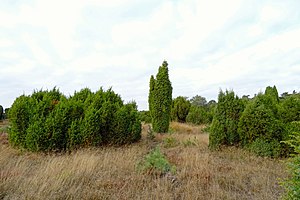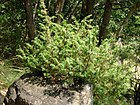Note: This is a project under development. The articles on this wiki are just being initiated and broadly incomplete. You can Help creating new pages.
Juniperus communis
Juniperus communis is a very variable, evergreen shrub or a tree with an erect stem. It can grow up to 12 metres tall, though it is more commonly within the range 1 - 3 metres. The branches can be erect or spreading, so crown shape is very variable.
Contents
[hide]- 1 Uses
- 2 Parts Used
- 3 Chemical Composition
- 4 Common names
- 5 Properties
- 6 Habit
- 7 Identification
- 8 List of Ayurvedic medicine in which the herb is used
- 9 Where to get the saplings
- 10 Mode of Propagation
- 11 How to plant/cultivate
- 12 Commonly seen growing in areas
- 13 Photo Gallery
- 14 References
- 15 External Links
Uses
Kidney problems, Bladder problems, Cystitis, Digestive problems, Chronic arthritis, Gout, Rheumatic conditions.[1]
Parts Used
Chemical Composition
Common names
| Language | Common name |
|---|---|
| Kannada | |
| Hindi | |
| Malayalam | |
| Tamil | |
| Telugu | |
| Marathi | |
| Gujarathi | |
| Punjabi | |
| Kashmiri | |
| Sanskrit | |
| English |
Properties
Reference: Dravya - Substance, Rasa - Taste, Guna - Qualities, Veerya - Potency, Vipaka - Post-digesion effect, Karma - Pharmacological activity, Prabhava - Therepeutics.
Dravya
Rasa
Guna
Veerya
Vipaka
Karma
Prabhava
Habit
Identification
Leaf
| Kind | Shape | Feature |
|---|---|---|
Flower
| Type | Size | Color and composition | Stamen | More information |
|---|---|---|---|---|
| {{{5}}} |
Fruit
| Type | Size | Mass | Appearance | Seeds | More information |
|---|---|---|---|---|---|
Other features
List of Ayurvedic medicine in which the herb is used
Where to get the saplings
Mode of Propagation
Seeds, Cuttings of mature wood, Air layering.
How to plant/cultivate
Juniperus communis is a very cold-hardy plant, able to tolerate temperatures down to around -40°c when fully dormant. However, although the fully dormant plant is very cold-tolerant, the young growth in spring can be damaged by late frosts.[4]
Commonly seen growing in areas
Pine woods, Moorland, Calcareous river banks, Mixed woods.
Photo Gallery
References
- Jump up ↑ Indian Medicinal Plants by C.P.Khare
- Jump up ↑ [Chemistry]
- Jump up ↑ [Morphology]
- Jump up ↑ Cultivation
External Links
- Ayurvedic Herbs known to be helpful to treat Kidney problems
- Ayurvedic Herbs known to be helpful to treat Bladder problems
- Ayurvedic Herbs known to be helpful to treat Cystitis
- Ayurvedic Herbs known to be helpful to treat Digestive problems
- Ayurvedic Herbs known to be helpful to treat Chronic arthritis
- Ayurvedic Herbs known to be helpful to treat Gout
- Ayurvedic Herbs known to be helpful to treat Rheumatic conditions
- Herbs with Fruits used in medicine
- Herbs with Stems used in medicine
- Herbs with Leaves used in medicine
- Habit - Evergreen shrub
- Index of Plants which can be propagated by Seeds
- Index of Plants which can be propagated by Cuttings of mature wood
- Index of Plants which can be propagated by Air layering
- Herbs that are commonly seen in the region of Pine woods
- Herbs that are commonly seen in the region of Moorland
- Herbs that are commonly seen in the region of Calcareous river banks
- Herbs that are commonly seen in the region of Mixed woods
- Herbs
- Pages without herbs images





